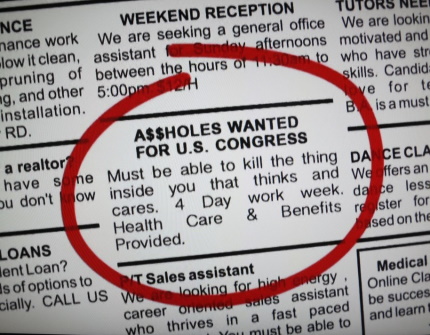(For a more precise authorship description, substitute the following:
by Bowen Craig, then Dr. Alice Rose, then back to Bowen)
Should we look for morality in our leaders? It’s a fair question. Moral relativism is pretty common now. “It’s not personal, it’s just business,” is our favorite catch-phrase to justify stealing what little the poor have and not having to feel guilty about it. “Sure, he’s a scum-bag, but he’s good at his job,” is what we say when we like a politician and want to justify continuing to like him.

With so many shockingly unprincipled occupants of the White House in my lifetime (Clinton, Cheney, Lord knows Trump) I have to question why we keep thinking it’s okay to elect habitual liars. In the 1990’s Clinton fans routinely excused his personal behavior. More recently Trump fans did the exact same thing. Political parties have proven themselves to be worse than serial killers in terms of morality. I’m not defending Charles Manson, but the man did have a code.
The excuses usually boil down to some version of “Yeah, he’s a bad guy, but look what he just did,” or more precisely, “Yes, he’s an asshole but he’s our asshole.”
Perhaps it’s time to stop electing assholes.
Moral relativism has reached plaguelike proportions. It’s everywhere. America once had a reliable counterbalance to run-away capitalism called religion. If you don’t know what that is, ask your grandparents. They took it seriously. You don’t. Even if you think you do, you probably don’t.
Without that table leg, the furniture crumbles. We need some agreed-upon moral authority to help us avoid thinking it’s fine to steal welfare checks from homeless guys or to stop us from looking the other way when we hear how bad our schools really are. The moral authority doesn’t have to be religion, but it needs to be strong enough to face-off against capitalism and find a balance. Since Dr. Alice Rose is a professional psychologist and, therefore, more familiar with the nuances of personal moral relativism, we wrote this one together.
Here’s Dr. Rose’s part:
I had a conversation with a right-wing friend recently. When I said X politician was being sued for rape of a 13 year old girl and should be dismissed from office her response was “They all do that.” It does not matter because it is the norm? Since when? How many times have you heard this response to something you are outraged about in a public figure?
I recall another instance when a politician bragged about grabbing women’s private parts. Some of it was outrageous. Many women stepped forward and complained so the grabbing was real. My friend said “Locker room talk.”
When I asked a gentle soul male friend about this, he said “Aww, he’s just doing what every man wishes he could do. I admire him.” I was shocked — against a woman’s will? My other male friends don’t find that attractive.
I have a theory — fragmentation abounds in our culture. Fragmentation is a psychological mechanism akin to compartmentalization — parts of experience and parts of ourselves are not in contact with each other.
I think higher education contributes to it.
If you have ever studied a complex topic in grad school, you have to specialize. There is too much to learn. You develop a myopic view — as if looking through a microscope and missing everything else around you.
I do believe that scientists create deadly things — such as bioweapons and other destructive things because they separate off their humanity from the thrill of the work. Lost in intellectual hedonism they section off the results of their work from the thrill of discovery. Otherwise they would be psychopaths.
Somewhere lost in history we remembered when the whole person was considered for a position. A politician’s integrity was considered an essential characteristic for the job — we knew he would do what was right, not just what profited him more financially, what was popular so he would get re-elected, or what would block every move of the opposing party.
Now, if this pol is doing what I like, I don’t care about anything else he does. His political behavior is separate from his moral behavior. He could murder someone in Times Square for all I care.
Now, the prevailing attitude seems to be,
“If this pol is doing what I like, I don’t care about anything else he does. His political behavior is separate from his moral behavior. He could murder someone in Times Square for all I care.”
What causes this? Is someone who is on their cell phone the entire time they are eating your Christmas dinner fragmented? Probably. They certainly are in two places at once. So did the addiction to social media contribute to this internal disconnect?

It’s Bowen again, here to comment on Dr. Rose’s comments. The woman knows her stuff. We do compartmentalize, often. I do it, too. In the case of our leaders, however, we shouldn’t.
Our standards have sunk to such depths that we barely even consider the possibility that we could, theoretically elect someone whose ideology we like and who is ALSO a decent human being. They exist. They may be standing in line at the post office right behind you. They tend to avoid politics. I don’t blame them for not wanting to enter a job where something stupid you wrote about dwarf tossing in college could cost you your job, but I do blame all of us. We’ve been corralled so deeply by these two political parties that we rarely question whether or not we need another party, or whether we need political parties at all. They’re not good for us. They’re like pepperoni pizza. Sure, it’s bad for you, but it’s everywhere and it’s been around so long that we forget that we could, if we wanted to, put sardines, or cantaloupe or Matchbox cars on our pizza.
We can do better. If we want to start talking to our family at Thanksgiving ever again, we probably should do better.
